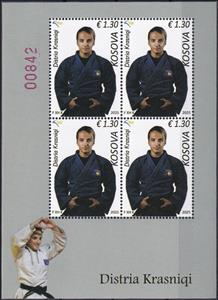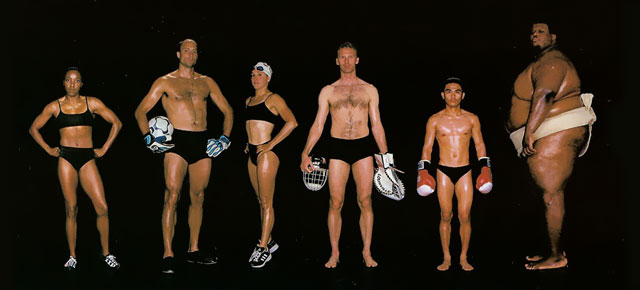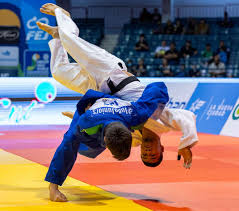Full Pane: Distria Krasniqi, Judoka (Kosovo 2025)
Distria Krasniqi, Judoka (Kosovo 2025)
04 July (Kosovo ) within release Distria Krasniqi, Judoka goes into circulation Full Pane Distria Krasniqi, Judoka face value 4*1.30 Euro
| Full Pane Distria Krasniqi, Judoka in catalogues | |
|---|---|
| Colnect codes: | Col: KO 2025.07.04-01a |
Full Pane is square format.
Also in the issue Distria Krasniqi, Judoka:
- Stamp - Distria Krasniqi, Judoka face value 1.30;
- Full Pane - Distria Krasniqi, Judoka face value 4*1.30;
|
Data entry completed
50%
|
|
|---|---|
| Full Pane Distria Krasniqi, Judoka in digits | |
| Country: | Kosovo |
| Date: | 2025-07-04 |
| Print: | Offset lithography |
| Emission: | Commemorative |
| Format: | Full Pane |
| Face Value: | 4*1.30 Euro |
Full Pane Distria Krasniqi, Judoka it reflects the thematic directions:
An athlete is most commonly a person who competes in one or more sports involving physical strength, speed, power, or endurance. Sometimes, the word "athlete" is used to refer specifically to sport of athletics competitors, i.e. including track and field and marathon runners but excluding e.g. swimmers, footballers or basketball players. However in other contexts (mainly in the United States) it is used to refer to all athletics (physical culture) participants of any sport. For the latter definition, the word sportsperson or its gendered sportsman or sportswoman are also used. A third definition is also sometimes used meaning anyone who is physically fit regardless of whether or not they compete in a spo
Famous People refers to the fame and public attention accorded by the mass media to individuals or groups or, occasionally, animals, but is usually applied to the persons or groups of people (celebrity couples, families, etc.) themselves who receive such a status of fame and attention. Celebrity status is often associated with wealth (commonly referred to as fame and fortune), while fame often provides opportunities to make money.
Judo (Japanese: 柔道, Hepburn: Jūdō, lit. 'gentle way') is an unarmed modern Japanese martial art, combat sport, Olympic sport (since 1964), and the most prominent form of jacket wrestling competed internationally. Judo was created in 1882 by Kanō Jigorō (嘉納 治五郎) as an eclectic martial art, distinguishing itself from its predecessors (primarily Tenjin Shinyo-ryu jujutsu and Kitō-ryū jujutsu) due to an emphasis on "randori" (乱取り, lit. 'free sparring') instead of "kata" (pre-arranged forms) alongside its removal of striking and weapon training elements.Judo rose to prominence for its dominance over established jujutsu schools in tournaments hosted by the Tokyo Metropolitan Police Department (警視庁武術大会, Keishicho Bujutsu Taikai), resulting in its adoption as the department's primary martial art.A judo practitioner is called a "judoka" (柔道家, jūdōka, lit. 'judo performer'), and the judo uniform is called "judogi" (柔道着, jūdōgi, lit. 'judo attire').


